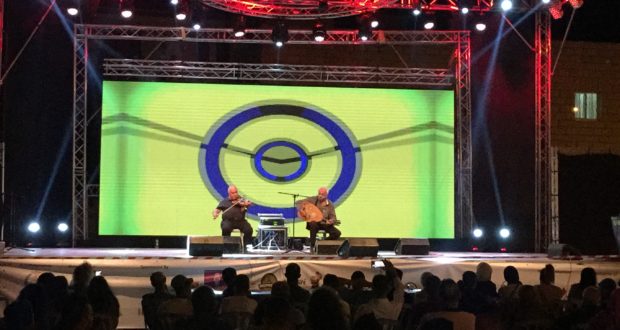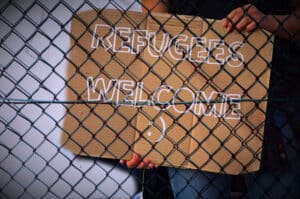
What images come to mind when you hear the words “little town of Bethlehem”? Idyllic, holy scenes of Mary, Joseph and Baby Jesus alongside friendly barnyard animals?
For a North American living in Bethlehem, this cozy scene feels like a childhood dream. The reality of Bethlehem today disrupts such heart-warming visions with disturbing sights. For those who manage to get off the tourist track and visit the real Bethlehem, the image grows dim with three refugee camps, lack of access to natural resources, and no freedom of movement for the city’s residents due in part to the separation barrier, constructed in 2002. And yet, like anywhere else, the people here feel a deep connection to and pride in their hometown.
The people of Bethlehem claim a hometown heritage stretching back thousands of years, documented in the Bible and celebrated around the world by people who sing of its significance as the place where God arrived in human form on earth. For today’s Bethlehemites, geo-political realities of the past few centuries have added a heritage of pain that reaches back beyond the earliest memories of the city’s elders. Understandably, a narrative of pain and hopelessness consumes many.
Amidst the scarred collective memory, however, there are people with a vision of living into the pride of Bethlehem by celebrating its history and claiming the potential that awaits it. The Bethlehem-based organization Holy Land Trust has now marked five years of making this vision a reality, if only for a few days each year, with their annual Bet Lahem Live festival. The event is founded on “creativity, faith, culture, and social justice,” fostering “Bethlehem identity, both locally and internationally… [and challenging] local and international communities to take action to envision an ideal future for Bethlehem, as well as for the people of the larger Palestinian community.” The four day event focuses on Bethlehem’s special heritage through a “multi-cultural platform for the arts.”
Amidst the scarred collective memories are people with a vision of living into the pride of Bethlehem by celebrating its history and claiming its potential.
Due to the current occupation and accompanying economic challenges, society here is continually shaped in ways it otherwise would not be. Everything molds and forms around the edges and boundaries of the conflict, as the occupation reaches into the deepest places of everyday life. It is evident that the people and the place itself are unable to live into the full potential that life outside of occupation offers. Initiatives that engender strong community cooperation and collaboration amongst civil society actors are intrinsic to healthy community formation.
Bet Lahem Live seeks to reimagine Star Street, a once flourishing commercial avenue, to enable Bethlehemites to see their own potential and that of their community spaces. Star Street is already a UNESCO World Heritage site, recognized as the Pilgrimage Route leading to the birthplace of Jesus at the Church of the Nativity, a site holy to both Christians and Muslims, who revere Jesus as a prophet. And just down the hill from Star Street is the area where Jews believe the Biblical story of Ruth and Boaz took place. This serves as a strategic location for the international community to learn about the current realities facing Palestinians, and for Palestinians to encounter solidarity with those from around the world who also count Bethlehem as a meaningful part of their spiritual and religious heritage.
Holy Land Trust Executive Director, Sami Awad, believes this initiative of faith and art that calls for justice is critical to strengthening the community for the future.
We want to empower the people on Star Street to have a strong voice in advocating for themselves. We want to celebrate what Bethlehem can become after occupation ends; we do not need to continue being victims. We should celebrate life even in the midst of death.
With each olive grove and dunam of land that is confiscated as a result of occupation, historic and religious space becomes all the more sacred. When a society values its heritage, community-building can flourish, which is critical for conflicted societies and necessary for the people of Bethlehem to engage in amidst their daily oppression. Ultimately, Awad believes that the community should recognize and observe Bethlehem as the city of peace that it is for so many around the world. The Bet Lahem Live festival is an initiative in which historic space is valued, with the aim of elevating Palestinian cultural identity within the people themselves, and to help them see a place in their midst symbolizing all that they have to be proud of.
Dear God,
Thank you for your presence in the midst of conflict. Where you revealed yourself to humanity 2,000 years ago, you are still present with the community of believers. We pray that you would empower the Christians of Bethlehem to creatively live into the Kingdom of God, and to persist in hope against the elusiveness of peace. Let us look to the future not with a hollow optimism in humanity’s self improvement, but with the fullness of hope that is rooted in the redemptive work of Christ.
Amen.
This article originally appeared at Prayers for the Holy Land. Prayer by Michael Santulli, Intern, Churches for Middle East Peace.
Would you like to spend Christmas in the Holy Land?
CSA’s Micky ScottBey Jones is coordinating the Sumud Freedom Tour, in partnership with Holy Land Trust and Nonviolence International. From December 21st through January 3rd, an intimate delegation of people interested in faith-rooted activism will travel to Israel/Palestine to spend time co-learning about different justice issues worldwide, strategic building across movements, and participation in nonviolent solidarity actions.
This tour will provide you with an opportunity to develop deeper understandings of justice in a multi-faith, multi-ethnic, multi-racial and multi-struggle context. Do you want to connect with international organizations, broaden your work abroad, and deepen your relationship with the work of CSA? Sign up today!


